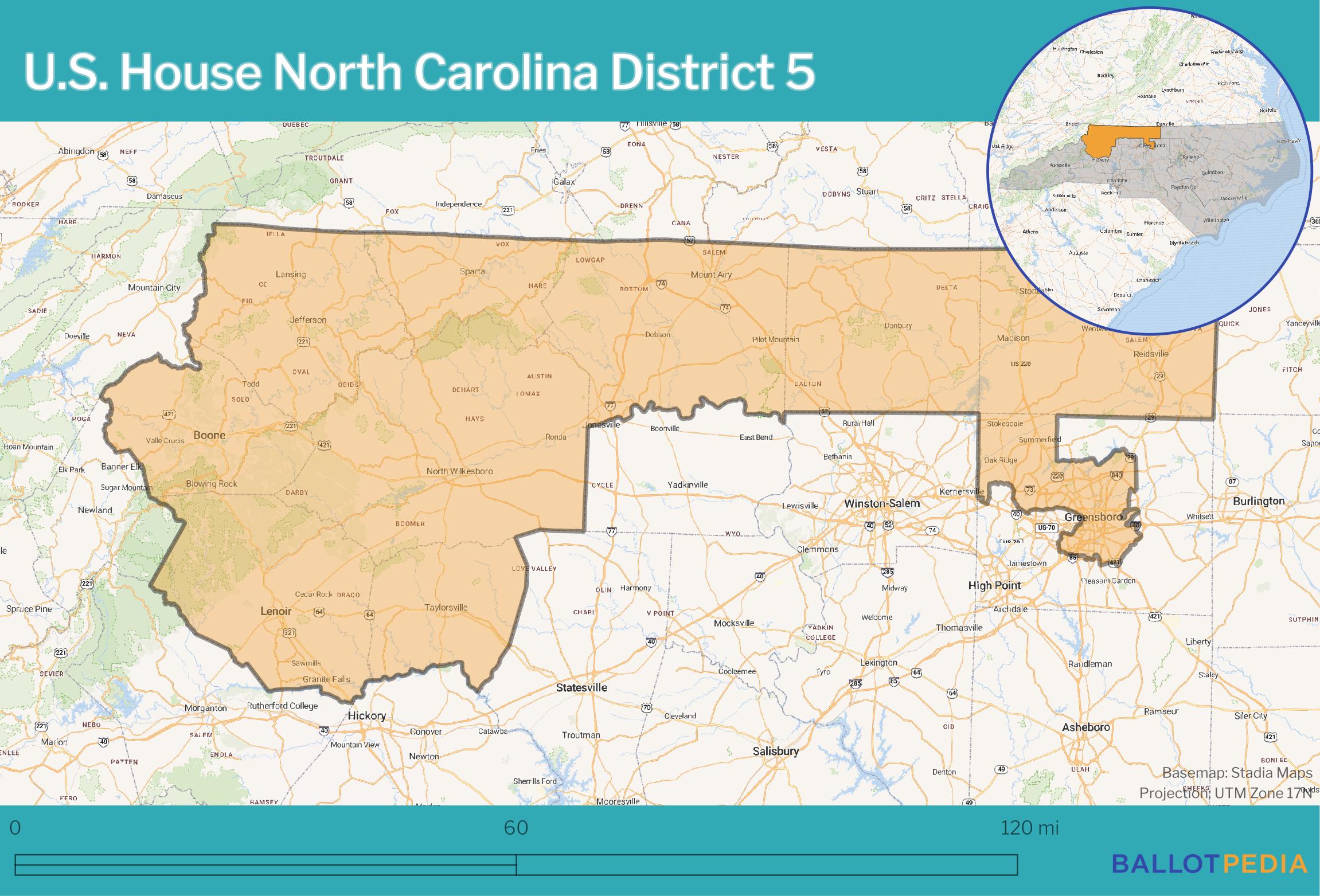North Carolina's 5th Congressional District
North Carolina's 5th Congressional District in the United States House of Representatives is represented by Virginia Foxx (R).
As of the 2020 Census, North Carolina representatives represented an average of 746,711 residents. After the 2010 Census, each member represented 735,829 residents.
Elections
See also: North Carolina's 5th Congressional District election, 2030
There are no official candidates yet for this election.
See also: North Carolina's 5th Congressional District election, 2028
There are no official candidates yet for this election.
See also: North Carolina's 5th Congressional District election, 2026
General election
The primary will occur on March 3, 2026. The general election will occur on November 3, 2026. General election candidates will be added here following the primary.
The candidate list in this election may not be complete.
General election for U.S. House North Carolina District 5
Robert Luffman (L) and David Clayton (Independent) are running in the general election for U.S. House North Carolina District 5 on November 3, 2026.
Candidate | ||
 | Robert Luffman (L)  | |
 | David Clayton (Independent)  | |
 = candidate completed the Ballotpedia Candidate Connection survey. = candidate completed the Ballotpedia Candidate Connection survey. | ||||
| If you are a candidate and would like to tell readers and voters more about why they should vote for you, complete the Ballotpedia Candidate Connection Survey. | ||||
Do you want a spreadsheet of this type of data? Contact our sales team. | ||||
Democratic primary
The candidate list in this election may not be complete.
Democratic primary for U.S. House North Carolina District 5
Kyah Creekmore (D) and Chuck Hubbard (D) are running in the Democratic primary for U.S. House North Carolina District 5 on March 3, 2026.
Candidate | ||
 | Kyah Creekmore  | |
 | Chuck Hubbard | |
 = candidate completed the Ballotpedia Candidate Connection survey. = candidate completed the Ballotpedia Candidate Connection survey. | ||||
| If you are a candidate and would like to tell readers and voters more about why they should vote for you, complete the Ballotpedia Candidate Connection Survey. | ||||
Do you want a spreadsheet of this type of data? Contact our sales team. | ||||
Republican primary
The candidate list in this election may not be complete.
Republican primary for U.S. House North Carolina District 5
Incumbent Virginia Foxx (R), Steve Girard (R), Joseph Osborne (R), and Roman Williams II (R) are running in the Republican primary for U.S. House North Carolina District 5 on March 3, 2026.
 = candidate completed the Ballotpedia Candidate Connection survey. = candidate completed the Ballotpedia Candidate Connection survey. | ||||
| If you are a candidate and would like to tell readers and voters more about why they should vote for you, complete the Ballotpedia Candidate Connection Survey. | ||||
Do you want a spreadsheet of this type of data? Contact our sales team. | ||||
Libertarian Party primary
The Libertarian Party primary scheduled for March 3, 2026, was canceled. Robert Luffman (L) advanced from the Libertarian Party primary for U.S. House North Carolina District 5 without appearing on the ballot.
See also: North Carolina's 5th Congressional District election, 2024
General election
General election for U.S. House North Carolina District 5
Incumbent Virginia Foxx (R) defeated Chuck Hubbard (D) in the general election for U.S. House North Carolina District 5 on November 5, 2024.
Candidate | % | Votes | ||
| ✔ |  | Virginia Foxx (R) | 59.5 | 238,304 |
 | Chuck Hubbard (D)  | 40.5 | 162,390 | |
| Total votes: 400,694 | ||||
 = candidate completed the Ballotpedia Candidate Connection survey. = candidate completed the Ballotpedia Candidate Connection survey. | ||||
| If you are a candidate and would like to tell readers and voters more about why they should vote for you, complete the Ballotpedia Candidate Connection Survey. | ||||
Do you want a spreadsheet of this type of data? Contact our sales team. | ||||
Democratic primary
The Democratic primary scheduled for March 5, 2024, was canceled. Chuck Hubbard (D) advanced from the Democratic primary for U.S. House North Carolina District 5 without appearing on the ballot.
Withdrawn or disqualified candidates
- Kyle Parrish (D)
Republican primary
Republican primary for U.S. House North Carolina District 5
Incumbent Virginia Foxx (R) defeated Ryan Mayberry (R) in the Republican primary for U.S. House North Carolina District 5 on March 5, 2024.
Candidate | % | Votes | ||
| ✔ |  | Virginia Foxx | 67.8 | 62,120 |
 | Ryan Mayberry | 32.2 | 29,457 | |
| Total votes: 91,577 | ||||
 = candidate completed the Ballotpedia Candidate Connection survey. = candidate completed the Ballotpedia Candidate Connection survey. | ||||
| If you are a candidate and would like to tell readers and voters more about why they should vote for you, complete the Ballotpedia Candidate Connection Survey. | ||||
Do you want a spreadsheet of this type of data? Contact our sales team. | ||||
See also: North Carolina's 5th Congressional District election, 2022
General election
General election for U.S. House North Carolina District 5
Incumbent Virginia Foxx (R) defeated Kyle Parrish (D) in the general election for U.S. House North Carolina District 5 on November 8, 2022.
Candidate | % | Votes | ||
| ✔ |  | Virginia Foxx (R) | 63.2 | 175,279 |
 | Kyle Parrish (D)  | 36.8 | 102,269 | |
| Total votes: 277,548 | ||||
 = candidate completed the Ballotpedia Candidate Connection survey. = candidate completed the Ballotpedia Candidate Connection survey. | ||||
| If you are a candidate and would like to tell readers and voters more about why they should vote for you, complete the Ballotpedia Candidate Connection Survey. | ||||
Do you want a spreadsheet of this type of data? Contact our sales team. | ||||
Democratic primary
The Democratic primary scheduled for May 17, 2022, was canceled. Kyle Parrish (D) advanced from the Democratic primary for U.S. House North Carolina District 5 without appearing on the ballot.
Republican primary
Republican primary for U.S. House North Carolina District 5
Incumbent Virginia Foxx (R) defeated Michael Ackerman (R) in the Republican primary for U.S. House North Carolina District 5 on May 17, 2022.
Candidate | % | Votes | ||
| ✔ |  | Virginia Foxx | 76.6 | 61,680 |
 | Michael Ackerman  | 23.4 | 18,868 | |
| Total votes: 80,548 | ||||
 = candidate completed the Ballotpedia Candidate Connection survey. = candidate completed the Ballotpedia Candidate Connection survey. | ||||
| If you are a candidate and would like to tell readers and voters more about why they should vote for you, complete the Ballotpedia Candidate Connection Survey. | ||||
Do you want a spreadsheet of this type of data? Contact our sales team. | ||||
See also: North Carolina's 5th Congressional District election, 2020
General election
General election for U.S. House North Carolina District 5
Incumbent Virginia Foxx (R) defeated David Wilson Brown (D) and Jeff Gregory (Constitution Party) in the general election for U.S. House North Carolina District 5 on November 3, 2020.
Candidate | % | Votes | ||
| ✔ |  | Virginia Foxx (R) | 66.9 | 257,843 |
 | David Wilson Brown (D)  | 31.1 | 119,846 | |
 | Jeff Gregory (Constitution Party) | 2.0 | 7,555 | |
| Total votes: 385,244 | ||||
 = candidate completed the Ballotpedia Candidate Connection survey. = candidate completed the Ballotpedia Candidate Connection survey. | ||||
| If you are a candidate and would like to tell readers and voters more about why they should vote for you, complete the Ballotpedia Candidate Connection Survey. | ||||
Do you want a spreadsheet of this type of data? Contact our sales team. | ||||
Democratic primary
Democratic primary for U.S. House North Carolina District 5
David Wilson Brown (D) defeated Eric Hughes (D) in the Democratic primary for U.S. House North Carolina District 5 on March 3, 2020.
Candidate | % | Votes | ||
| ✔ |  | David Wilson Brown  | 68.0 | 34,339 |
| Eric Hughes | 32.0 | 16,139 | ||
| Total votes: 50,478 | ||||
 = candidate completed the Ballotpedia Candidate Connection survey. = candidate completed the Ballotpedia Candidate Connection survey. | ||||
| If you are a candidate and would like to tell readers and voters more about why they should vote for you, complete the Ballotpedia Candidate Connection Survey. | ||||
Do you want a spreadsheet of this type of data? Contact our sales team. | ||||
Withdrawn or disqualified candidates
- Jeanne Supin (D)
Republican primary
The Republican primary scheduled for March 3, 2020, was canceled. Incumbent Virginia Foxx (R) advanced from the Republican primary for U.S. House North Carolina District 5 without appearing on the ballot.
Constitution Party primary
The Constitution Party primary scheduled for March 3, 2020, was canceled. Jeff Gregory (Constitution Party) advanced from the Constitution Party primary for U.S. House North Carolina District 5 without appearing on the ballot.
See also: United States House of Representatives elections in North Carolina, 2018
General election
General election for U.S. House North Carolina District 5
Incumbent Virginia Foxx (R) defeated Denise Adams (D) in the general election for U.S. House North Carolina District 5 on November 6, 2018.
Candidate | % | Votes | ||
| ✔ |  | Virginia Foxx (R) | 57.0 | 159,917 |
 | Denise Adams (D) | 43.0 | 120,468 | |
| Total votes: 280,385 (100% precincts reporting) | ||||
 = candidate completed the Ballotpedia Candidate Connection survey. = candidate completed the Ballotpedia Candidate Connection survey. | ||||
| If you are a candidate and would like to tell readers and voters more about why they should vote for you, complete the Ballotpedia Candidate Connection Survey. | ||||
Do you want a spreadsheet of this type of data? Contact our sales team. | ||||
Democratic primary
Democratic primary for U.S. House North Carolina District 5
Denise Adams (D) defeated Jenny Marshall (D) in the Democratic primary for U.S. House North Carolina District 5 on May 8, 2018.
Candidate | % | Votes | ||
| ✔ |  | Denise Adams | 54.4 | 15,509 |
 | Jenny Marshall | 45.6 | 12,987 | |
| Total votes: 28,496 | ||||
 = candidate completed the Ballotpedia Candidate Connection survey. = candidate completed the Ballotpedia Candidate Connection survey. | ||||
| If you are a candidate and would like to tell readers and voters more about why they should vote for you, complete the Ballotpedia Candidate Connection Survey. | ||||
Do you want a spreadsheet of this type of data? Contact our sales team. | ||||
Republican primary
Republican primary for U.S. House North Carolina District 5
Incumbent Virginia Foxx (R) defeated Dillon Gentry (R) and Cortland Meader (R) in the Republican primary for U.S. House North Carolina District 5 on May 8, 2018.
Candidate | % | Votes | ||
| ✔ |  | Virginia Foxx | 80.8 | 32,654 |
| Dillon Gentry | 14.1 | 5,703 | ||
| Cortland Meader | 5.1 | 2,063 | ||
| Total votes: 40,420 | ||||
 = candidate completed the Ballotpedia Candidate Connection survey. = candidate completed the Ballotpedia Candidate Connection survey. | ||||
| If you are a candidate and would like to tell readers and voters more about why they should vote for you, complete the Ballotpedia Candidate Connection Survey. | ||||
Do you want a spreadsheet of this type of data? Contact our sales team. | ||||
Withdrawn or disqualified candidates
- Matthew Vera (R)
District map

Redistricting
2025-2026
North Carolina redrew its congressional map ahead of the 2026 elections. The state Senate approved a new congressional map on October 21, 2025, and the state House followed on October 22, 2025.[9][10] The New York Times' Eduardo Medina wrote, "Republicans already have control of 10 of the state’s 14 congressional seats. The new map could give them an extra seat in the First Congressional District, which previously included all eight of the state’s majority Black counties and has now been redrawn to include more conservative-leaning counties. The district is currently held by Representative Don Davis, a Democrat."[11]
2020-2023
On October 25, 2023, the North Carolina General Assembly adopted new congressional district boundaries.[12] The legislation adopting the new maps passed the state Senate by a vote of 28-18 and the State House by a vote of 64-40.[13] Both votes were strictly along party lines with all votes in favor by Republicans and all votes against by Democrats.[14][15]
The New York Times' Maggie Astor wrote, "The map creates 10 solidly Republican districts, three solidly Democratic districts and one competitive district. Currently, under the lines drawn by a court for the 2022 election, each party holds seven seats. The Democratic incumbents who have been essentially drawn off the map are Representatives Jeff Jackson in the Charlotte area, Kathy Manning in the Greensboro area and Wiley Nickel in the Raleigh area. A seat held by a fourth Democrat, Representative Don Davis, is expected to be competitive."[12]
How does redistricting in North Carolina work? In North Carolina, the state legislature is responsible for drawing both congressional and state legislative district lines. District maps cannot be vetoed by the governor. State legislative redistricting must take place in the first regular legislative session following the United States Census. There are no explicit deadlines in place for congressional redistricting.[16]
State law establishes the following requirements for state legislative districts:[16]
- Districts must be contiguous and compact.
- Districts "must cross county lines as little as possible." If counties are grouped together, the group should include as few counties as possible.
- Communities of interest should be taken into account.
There are no similar restrictions in place regarding congressional districts.[16]
Below are the congressional maps in effect before and after the 2020 redistricting cycle. The map on the right was in effect for North Carolina’s 2024 congressional elections.
Below are the congressional maps in effect before and after the 2020 redistricting cycle. The map on the right was in effect for North Carolina’s 2024 congressional elections.
Below are the congressional maps in effect before and after the 2020 redistricting cycle. The map on the right was in effect for North Carolina’s 2024 congressional elections.
2020

2024

North Carolina's congressional district plan was subject to litigation following its adoption in 2011. Two challenges to the plan were heard by the Supreme Court of the United States: Cooper v. Harris, which was decided in 2017, and Rucho v. Common Cause, which decided on June 27, 2019. As a result of Rucho, North Carolina's congressional district plan was upheld. For more complete information, see this article.
District analysis
- See also: The Cook Political Report's Partisan Voter Index
- See also: FiveThirtyEight's elasticity scores
2026
Heading into the 2026 elections, based on results from the 2024 and 2020 presidential elections, the Cook Partisan Voter Index for this district is R+9. This meant that in those two presidential elections, this district's results were 9 percentage points more Republican than the national average. This made North Carolina's 5th the 145th most Republican district nationally.[17]
2024
Heading into the 2024 elections, based on results from the 2020 and 2016 presidential elections, the Cook Partisan Voter Index for this district was R+10. This meant that in those two presidential elections, this district's results were 10 percentage points more Republican than the national average. This made North Carolina's 5th the 145th most Republican district nationally.[18]
Daily Kos calculated what the results of the 2020 presidential election in this district would have been following redistricting. Donald Trump (R) would have defeated Joe Biden (D) 57.2%-41.8%.[19]
2022
Heading into the 2022 elections, based on results from the 2020 and 2016 presidential elections, the Cook Partisan Voter Index for this district was R+13. This meant that in those two presidential elections, this district's results were 13 percentage points more Republican than the national average. This made North Carolina's 5th the 112th most Republican district nationally.[20]
Daily Kos calculated what the results of the 2020 presidential election in this district would have been following redistricting. Joe Biden (D) would have received 38.8% of the vote in this district and Donald Trump (R) would have received 60.1%.[21]
2018
Heading into the 2018 elections, based on results from the 2016 and 2012 presidential elections, the Cook Partisan Voter Index for this district was R+18. This meant that in those two presidential elections, this district's results were 18 percentage points more Republican than the national average. This made North Carolina's 5th Congressional District the 55th most Republican nationally.[22]
FiveThirtyEight's September 2018 elasticity score for states and congressional districts measured "how sensitive it is to changes in the national political environment." This district's elasticity score was 1.08. This means that for every 1 point the national political mood moved toward a party, the district was expected to move 1.08 points toward that party.[23]
See also
- Redistricting in North Carolina
- North Carolina's 5th Congressional District election, 2026
- North Carolina's 5th Congressional District election, 2024
- North Carolina's 5th Congressional District election, 2022
- North Carolina's 5th Congressional District election, 2020
- North Carolina's 5th Congressional District election, 2018
External links
Footnotes
- ↑ North Carolina State Board of Elections, "June Primary Candidates," accessed March 27, 2016
- ↑ Politico, "2012 Election Map, North Carolina," accessed November 7, 2012
- ↑ U.S. Congress House Clerk, "Statistics of the Congressional Election of November 2, 2010," accessed March 28, 2013
- ↑ U.S. Congress House Clerk, "Statistics of the Congressional Election of November 4, 2008," accessed March 28, 2013
- ↑ U.S. Congress House Clerk, "Statistics of the Congressional Election of November 7, 2006," accessed March 28, 2013
- ↑ U.S. Congress House Clerk, "Statistics of the Congressional Election of November 2, 2004," accessed March 28, 2013
- ↑ U.S. Congress House Clerk, "Statistics of the Congressional Election of November 5, 2002," accessed March 28, 2013
- ↑ U.S. Congress House Clerk, "Statistics of the Congressional Election of November 7, 2000," accessed March 28, 2013
- ↑ Cite error: Invalid
<ref>tag; no text was provided for refs namedsenatepass - ↑ Cite error: Invalid
<ref>tag; no text was provided for refs namedhousepass - ↑ New York Times, "North Carolina State Senate Approves New Congressional Map in Effort to Add a Seat," October 21, 2025
- ↑ 12.0 12.1 The New York Times, "North Carolina Republicans Approve House Map That Flips at Least Three Seats," October 26, 2023
- ↑ North Caroliina General Assembly, "Senate Bill 757 / SL 2023-145," accessed October 26, 2023
- ↑ North Caroliina General Assembly, "House Roll Call Vote Transcript for Roll Call #613," accessed October 26, 2023
- ↑ North Caroliina General Assembly, "Senate Roll Call Vote Transcript for Roll Call #492," accessed October 26, 2023
- ↑ 16.0 16.1 16.2 All About Redistricting, "North Carolina," accessed April 20, 2015
- ↑ Cook Political Report, "2025 Cook PVI℠: District Map and List (119th Congress)," accessed July 1, 2025
- ↑ Cook Political Report, "The 2022 Cook Partisan Voting Index (Cook PVI℠)," accessed January 10, 2024
- ↑ Daily Kos, "Daily Kos Elections' 2020 presidential results by congressional district, for new and old districts," accessed September 15, 2022
- ↑ Cook Political Report, "The 2022 Cook Partisan Voting Index (Cook PVI℠)," accessed February 6, 2023
- ↑ Daily Kos, "Daily Kos Elections' 2020 presidential results by congressional district, for new and old districts," accessed September 15, 2022
- ↑ Cook Political Report, "Introducing the 2017 Cook Political Report Partisan Voter Index," April 7, 2017
- ↑ FiveThirtyEight, "Election Update: The Most (And Least) Elastic States And Districts," September 6, 2018







